Introduction
The success of a digital product often depends on one key decision — choosing the right product engineering services company. In an age where speed, scalability, and user experience define competitiveness, having a skilled engineering partner is not just helpful — it’s essential.
Product engineering services go beyond coding. They encompass everything from concept design and user research to full-cycle software development, deployment, and continuous innovation. But with so many product engineering firms and outsourcing vendors in the market, how do you separate a true innovation partner from a generic development agency?
Let’s break down the selection process step-by-step — from understanding your needs to evaluating capability, culture, and trust.
1. Clarify What You Actually Need
Before you start comparing vendors, map your internal goals:
- Are you building a new digital product, or modernizing a legacy platform?
- Do you need full-cycle software product engineering services or specific support like UX design, DevOps, or QA?
- Is this a one-time project or a long-term partnership?
Clarity ensures your conversations with vendors are strategic, not vague.
2. Evaluate Core Competence
A credible product engineering services company must demonstrate end-to-end capability:
- Consulting expertise: Can they help you refine product strategy?
- Engineering strength: Do they deliver modern, scalable architectures (cloud, microservices, API-first)?
- Quality and DevOps maturity: Is testing automated? Is CI/CD embedded in their delivery process?
- Cross-domain experience: Have they served industries similar to yours — e.g., fintech, healthcare, retail, or manufacturing?
Ask for case studies that show measurable impact — faster release cycles, reduced cost, improved uptime, or user growth.
3. Check for Cultural and Communication Fit
This is often overlooked but critical. A good software product engineering company works like an extension of your in-house team. Observe how they communicate:
- Are they transparent and responsive?
- Do they challenge assumptions and bring new ideas?
- How do they handle feedback and ambiguity?
True partners don’t just execute — they co-create.
4. Security, IP, and Legal Confidence
Your intellectual property is your competitive edge. Confirm that the product engineering partner provides:
- Strong IP protection clauses (you own the source code and assets).
- Clear data confidentiality (NDA, restricted access).
- Proven compliance with industry standards like ISO, GDPR, SOC 2, or HIPAA.
5. Assess Their Process, Not Just Promises
During discussions, ask them to walk you through their process:
- How do they handle change requests mid-project?
- What tools are used for project management, communication, and tracking?
- How do they define “done”?
Consistency in delivery matters as much as innovation.
6. Start with a Pilot Project
Instead of large commitments upfront, test the waters with a smaller engagement — an MVP, prototype, or modernization sprint. This allows you to evaluate technical quality, collaboration rhythm, and delivery predictability before scaling up.
read more : 10 Proven Duck Hunting Strategies Using Dive Bomb Products
7. Pricing Models and Transparency
Different projects need different commercial models:
- Fixed cost – suitable for short, well-defined projects.
- Time & material – flexible for ongoing R&D or evolving requirements.
- Dedicated teams – ideal for long-term innovation partnerships.
The best product engineering companies offer flexibility while ensuring clear visibility into how time and cost are tracked.
8. Red Flags to Avoid
- Unrealistically low estimates.
- Lack of client references.
- Overpromising on timelines.
- Vague or inconsistent communication.
- No clarity on IP ownership.
Conclusion
Selecting the right product engineering services company is a strategic decision, not a procurement task. Look for a team that not only codes but collaborates, challenges, and scales with you. A true engineering partner turns ideas into value — and value into long-term digital success.




